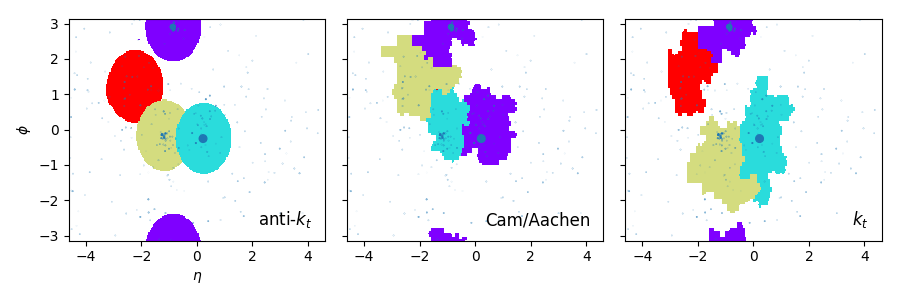The interface between FastJet and NumPy
Project description
pyjet allows you to perform jet clustering with FastJet on NumPy arrays. By default pyjet only depends on NumPy and internally uses FastJet’s standalone fjcore release. The interface code is written in Cython that then becomes compiled C++, so it’s fast.
pyjet provides the cluster() function that takes a NumPy array as input and returns a ClusterSequence from which you can access the jets:
from pyjet import cluster
from pyjet.testdata import get_event
vectors = get_event()
sequence = cluster(vectors, R=1.0, p=-1)
jets = sequence.inclusive_jets() # list of PseudoJetsThe first four fields of the input array vectors must be either:
np.dtype([('pT', 'f8'), ('eta', 'f8'), ('phi', 'f8'), ('mass', 'f8')])or if cluster(..., ep=True):
np.dtype([('E', 'f8'), ('px', 'f8'), ('py', 'f8'), ('pz', 'f8')])This array may have additional fields of any type. Additional fields will then become attributes of the PseudoJet objects.
See the examples to get started:

Standalone Installation
To simply use the built-in FastJet source:
pip install --user pyjet
And you’re good to go!
Get example.py and run it:
curl -O https://raw.githubusercontent.com/ndawe/pyjet/master/examples/example.py python example.py jet# pT eta phi mass #constit. 1 983.280 -0.868 2.905 36.457 34 2 901.745 0.221 -0.252 51.850 34 3 67.994 -1.194 -0.200 11.984 32 4 12.465 0.433 0.673 5.461 13 5 6.568 -2.629 1.133 2.099 9 6 6.498 -1.828 -2.248 3.309 6 The 6th jet has the following constituents: PseudoJet(pt=0.096, eta=-2.166, phi=-2.271, mass=0.000) PseudoJet(pt=2.200, eta=-1.747, phi=-1.972, mass=0.140) PseudoJet(pt=1.713, eta=-2.037, phi=-2.469, mass=0.940) PseudoJet(pt=0.263, eta=-1.682, phi=-2.564, mass=0.140) PseudoJet(pt=1.478, eta=-1.738, phi=-2.343, mass=0.940) PseudoJet(pt=0.894, eta=-1.527, phi=-2.250, mass=0.140) Get the constituents as an array (pT, eta, phi, mass): [( 0.09551261, -2.16560157, -2.27109083, 4.89091390e-06) ( 2.19975694, -1.74672746, -1.97178728, 1.39570000e-01) ( 1.71301882, -2.03656511, -2.46861524, 9.39570000e-01) ( 0.26339374, -1.68243005, -2.56397904, 1.39570000e-01) ( 1.47781519, -1.7378898 , -2.34304346, 9.39570000e-01) ( 0.89353864, -1.52729244, -2.24973202, 1.39570000e-01)] or (E, px, py, pz): [( 0.42190436, -0.06155242, -0.07303395, -0.41095089) ( 6.50193926, -0.85863306, -2.02526044, -6.11692764) ( 6.74203628, -1.33952806, -1.06775374, -6.45273802) ( 0.74600384, -0.22066287, -0.1438199 , -0.68386087) ( 4.43164941, -1.0311407 , -1.05862485, -4.07096881) ( 2.15920027, -0.56111108, -0.69538886, -1.96067711)]
Using an External FastJet Installation
To take advantage of the full FastJet library and optimized O(NlnN) kt and anti-kt algorithms you can first build and install FastJet and then install pyjet with the --external-fastjet flag. Before building FastJet you will need to install CGAL and GMP.
On a Debian-based system (Ubuntu):
sudo apt-get install libcgal-dev libcgal11v5 libgmp-dev libgmp10
On an RPM-based system (Fedora):
sudo dnf install gmp.x86_64 gmp-devel.x86_64 CGAL.x86_64 CGAL-devel.x86_64
On Mac OS:
brew install cgal gmp wget
Then run pyjet’s install-fastjet.sh script:
curl -O https://raw.githubusercontent.com/ndawe/pyjet/master/install-fastjet.sh chmod +x install-fastjet.sh sudo ./install-fastjet.sh
Now install pyjet like:
pip install --user pyjet --install-option="--external-fastjet"
pyjet will now use the external FastJet installation on your system.
Project details
Release history Release notifications | RSS feed
Download files
Download the file for your platform. If you're not sure which to choose, learn more about installing packages.
Source Distribution
File details
Details for the file pyjet-0.5.0.tar.gz.
File metadata
- Download URL: pyjet-0.5.0.tar.gz
- Upload date:
- Size: 164.3 kB
- Tags: Source
- Uploaded using Trusted Publishing? No
File hashes
| Algorithm | Hash digest | |
|---|---|---|
| SHA256 | a4c7f1f99fc4ba0ab6d2ae7f3bfeb99ffd2b07f16e3425b13464618beef56192 |
|
| MD5 | 3bf7759366390448e2d7368095642336 |
|
| BLAKE2b-256 | 4939c106d64cc326b2eb5fb43ba3c44cab8560fcc71410c72e680cf605b1430a |













